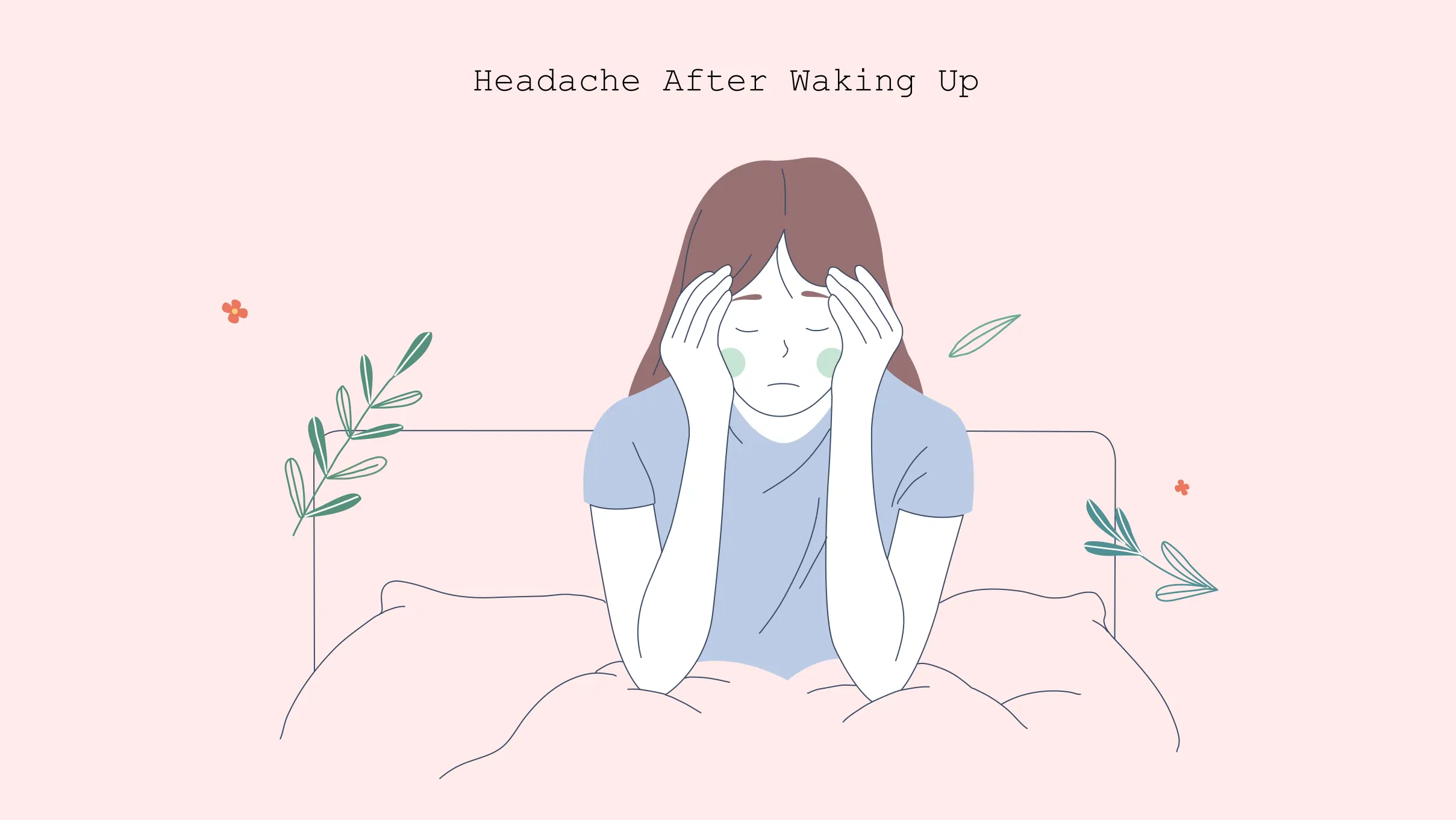Headache after Waking Up : 10 Reasons & Remedies
Written by


Headache after waking up isn’t an uncommon health issue today. Many face it frequently due to several causes like sleep and lifestyle disorders. Estimation says that almost half of the adult population has had a headache at least once within the last year. But, there’s always a cure for it. If you want to know in detail, scroll down.
What Causes Morning Headaches?
You’re probably not the single person asking: why do I wake up with a headache? Well, the most common reason is a sleep disorder. But, there are other factors too that you need to be aware of. Accordingly, you can make a change in your sleeping pattern or lifestyle.
Here’s an insight into what causes morning headaches:
During the phase you wake up from sleep, your brain becomes responsive. Your body posture, external sounds, and touches also play a vital role in this phase. It’s a high sensitivity phase when you become more vulnerable to pain.
The Hypothalamus is a structure in your brain that controls your bodily functions and sleep cycles. Additionally, it responds to pain and sensation, which can affect your sleep. However, as you sleep, the organ can control pain but releases it when you wake up.
This is why you might not feel the pain while sleeping but wake up with a pounding headache. Here are some common reasons for waking up with headaches.
1. Migraine
Migraine is a headache disorder that triggers more often in the morning than during the day. It’s a terrible condition that causes moderate to severe throbbing headaches that can recur anytime. Migraine is common in adults aged between 35 and 45 years, and it is significantly more common in women, usually by a factor of about 2:1, because of hormonal influences.
Migraine leads to sleep loss which can again cause a migraine. And the whole process recurs like a cycle. Plus, there could be chances of malignancy in people with migraine. Hence, it’s important to diagnose whether you have a migraine.
Musculoskeletal Disease
It’s a common disease that occurs due to injuries in nerves, muscles, and tendons. The condition may also occur due to cartilage, joints, and spinal disk injuries. But, when accompanied by a headache, it’s known as tension headache (TTH). The headache is mild to moderate and occurs in the entire head. You can get yourself diagnosed to confirm whether your profession or lifestyle is causing too much stress, leading to TTH.
Cluster Headache
Cluster headache is a type of headache that occurs on one side of the head and around the eyes. Though the actual cause of this headache is unknown, experts suggest that a disturbance in the hypothalamus could be it. Men are more prone to cluster headaches than women and usually start experiencing them before 30.
Cervicogenic Headache
CGH or Cervicogenic Headache often occurs with neck pain. The main reason for this headache is stressful neck movement, which reduces the range of motion. Cervicogenic headaches originate from diseases of the spine or the surrounding joints.
If you have a headache after waking up from a nap, it could be a Cervicogenic Headache due to a restricted or disturbed neck posture.
Hypnic Headache
Hypnic headache or alarm clock headache happens at the same time every day. Though the causes are still unknown, it is suggested that hypothalamic dysregulation may be the pathologic mechanism that triggers this headache syndrome.
Exploding head syndrome
EHS, or exploding head syndrome, is a disorder that makes you hear sudden noises during sleep. The noises are loud, like explosive crackers, and not real. The usual time of the episode is while falling asleep or waking up.
2. Sleep Disorders
Sleep disorders are common causes of morning headaches. Here are a few sleep disorders that can disturb your sleep and wake you up with a throbbing headache.
Sleep Apnea
Sleep apnea or obstructive sleep apnea is a condition that obstructs breathing during sleep. If you have OSA, a morning headache could be one of its symptoms. Usually, morning headaches due to sleep apnea do not last for more than 30 minutes.
Nighttime Bruxism (Teeth Grinding)
Sleep bruxism or nighttime bruxism is a condition in which people grind or clench their teeth while asleep. The movement of teeth grinding is highly forceful, which can wake you up with a terrible headache. You must diagnose it immediately, as this can damage teeth and gums.
Insomnia
Insomnia is a consecutive lack of sleep daily. If you have insomnia, it can lead to a headache in the morning. Reducing insomnia can help you sleep better and relieve morning headaches. The other symptoms of insomnia are weakness, fatigue, anxiety and depression.
Oversleeping
You’ll be surprised to know that oversleeping is quite a severe issue that can lead to morning headaches. It’s known as an oversleeping headache. However, sometimes, oversleeping happens when you get low-quality sleep at night.
Restoring your natural wake-sleep cycle is the best way to avoid a morning headache caused by oversleeping.
3. Muscle Tension From Poor Sleep Posture
As you sleep, muscle strains may occur due to improper posture. In addition, it can lead to a painful sensation in the body and head. Hence, you must start by changing your sleeping position first, as sleep posture is essential to prevent neck and shoulder musculoskeletal pain.
4. Temporomandibular Joint (TMJ) Disorder
TMJ, or temporomandibular joint disorder, is a pain in and around your jaw muscles. It means the hinge connecting the upper and lower jaw isn’t working correctly. If you have TMJ, you may also have a headache in the morning after waking up.
5. Medication
Medications can disturb your sleep patterns, resulting in these headaches.
Another cause is medication overuse headache, which happens when you take too many painkillers. Do check with your doctor if certain medications are causing disturbed sleep.
6. Tumour
If you’ve been waking up with a terrible headache for quite some time now, it’s time to see a doctor immediately. That’s because brain or other tumours in the body can also lead to morning headaches.
7. Alcohol or Drugs
Alcohol or stimulating drugs can lead to a morning headache. In fact, it’s one of the most common causes of morning headaches. Excessive alcohol causes dehydration, and one of the most common symptoms of dehydration is a headache.
If you had plenty of drinks or drugs last night, your morning headache is a part of the hangover.
8. Depression and Anxiety
Long-term depression or anxiety could also contribute to a morning headache. Mood disorder is closely associated with migraines and sleeplessness, which can lead to headaches. According to medical reports, people with depression and anxiety and more prone to morning headaches than others.
9. Diet
A restricted diet and eating less can lead to morning headaches. So in case you’re having a morning headache after you’ve started following a special diet, it’s time to avoid the diet. It’s a sign of lack of nutrition, which isn’t good for your overall health. Check out this NDTV article where Priyanka Agarwal, a dietician at Max hospital, goes into more detail regarding Weight loss diet, and headaches.
10. Allergens in the Home
A sinus headache is caused by swelling in the sinuses that block the openings, preventing drainage and causing pressure to build up. Common allergens like pollen, mould and pet dander can cause your body’s immune system to react with a sinus headache.
How to Avoid Morning Headache
Though morning headaches are a common health issue, it doesn’t mean it’s incurable. Here are a few lifestyle modifications that you can do to keep morning headaches at bay:
- Ensure 7-8 hours of sleep daily
- Maintain a regular sleep cycle
- Try to sleep in the same bed every day
- Try meditation or bedtime yoga or breathing exercises for sleep
- Massage therapy to release muscle and joint pains
- Use a heat pack to relieve muscle tension
- Use a cold pack to ease migraine
- Take a warm or hot shower before bed
- Avoid drugs, nicotine, alcohol
- Avoid unhealthy diet
- Use mouth guards and CPAP for sleep apnea
- Use DNA oral appliance for teeth grinding
- Start following a balanced, healthy diet
When to See a Doctor
If you’re having other symptoms like vomiting, fever, and memory lack, besides morning headache, it’s time to see a doctor. Such symptoms indicate severe health issues only a medical professional can help you with.
Also, it’s time to see a psychologist if you’re often feeling depressed, stressed or anxious. Mental health is as important as physical health. With proper medical help, your morning headaches and other symptoms should disappear.
Conclusion
Now that you know the causes of morning headaches and treatments to follow, just go ahead and bring a positive change. If you’re having other health issues such as high cholesterol levels, high blood pressure or diabetes, it’s better to consult your doctor to cure the problem.
FAQs
Is morning headache a red flag?
Regular morning headaches could be a red flag alarming you of moderate to severe health or lifestyle issues. However, new, unusual headaches aren’t that serious.
Can anxiety cause headaches?
Yes, anxiety or GAD (general anxiety disorder) is one of the major causes of headaches. You need to undergo treatment for GAD if you’re having frequent headaches.
people like this article
Written by








